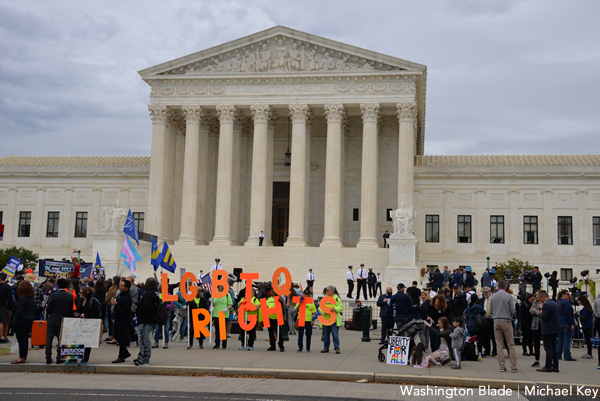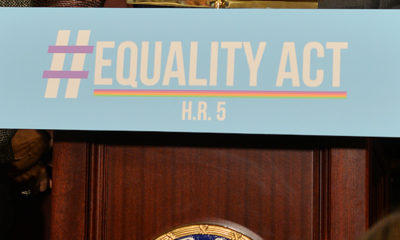Politics
HISTORIC: Senate panel advances trans-inclusive ENDA
In first, committee reports out trans-inclusive LGBT anti-bias bill
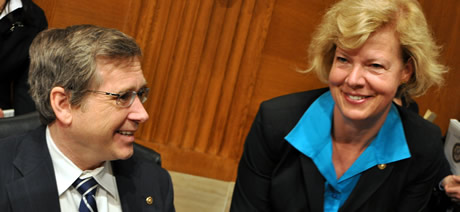
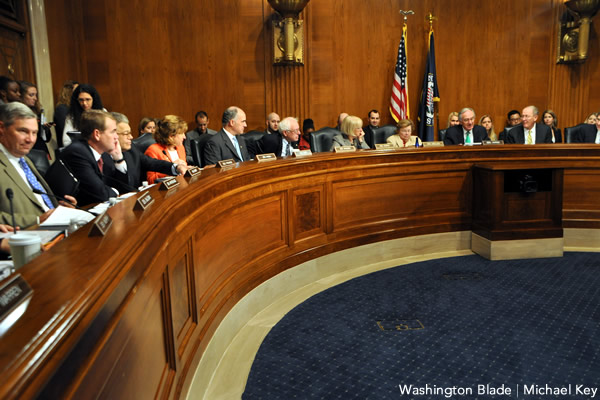
Senate Health, Education, Labor & Pensions Committee approved a trans-inclusive ENDA on Wednesday (Washington Blade photo by Michael Key)
A Senate committee made history on Wednesday by approving for the first time a trans-inclusive version of the Employment Non-Discrimination Act and picking up key Republican support from Sens. Orrin Hatch (R-Utah) and Lisa Murkowski (R-Alaska).
Lawmakers on the Senate Health, Education, Labor & Pensions Committee reported out ENDA by a 15-7 vote after a short period of discussion. No amendments were offered except for a manager’s amendment, although Sen. Lamar Alexander (R-Tenn.) said he’ll reserve three that he planned for consideration on the Senate floor.
Senate HELP Committee Chair Tom Harkin (D-Iowa) noted the historic nature of the committee’s action prior to the vote and said it’s “time, long past time” for Congress to take action against LGBT workplace discrimination.
“Qualified workers should not be turned away or have to fear losing their livelihood for reasons that have nothing to do with their qualifications, skills or performance,” Harkin said. “Let’s not mince words: such practices are un-American. They should have no place in any American workplace.”
All 12 Democrats on the committee, including lesbian Sen. Tammy Baldwin (D-Wis.), are co-sponsors of the bill as well as one Republican, Sen. Mark Kirk (R-Ill.). They each voted in favor of ENDA during the final vote.
At the start of the markup, Kirk explained he has supported ENDA — both in his capacity as a U.S. House member and a U.S. senator — because gay people should “not have that cloud of potential discrimination” in the workplace.
Speaking with reporters afterwards, Kirk explained his support for ENDA derives in part from his work as an officer in the Navy Reserve.
“For me, as you guys know, I’m a military guy,” Kirk said. “We think about how blindingly idiotic it was for Adolf Hitler to discriminate against the Jews. When you think about all the Senate pieces of the Manhattan Project, we actually developed a war-winning weapon because we were protecting creativity and science, and we became a much stronger society that allowed us to prevail. The society that is more open will be stronger, in my view, probably economically and militarily.”
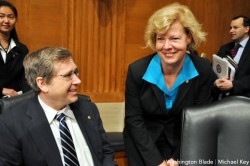
Sen. Mark Kirk (R-Ill.) and Sen. Tammy Baldwin (D-Wis.) (Washington Blade photo by Michael Key)
New support for ENDA also came from Republicans on the panel: Hatch and Murkowksi. Hatch voted “yes” by proxy and Murkowski voted “yes” in person. The Alaska senator is the third sitting Republican U.S. senator to come out in favor of marriage equality.
In a statement after the markup, Murkowski said she voted “yes” because “discrimination should never be tolerated in the workplace.”
“I am a strong believer that individuals should be judged on whether they can do the job, not their sexual orientation – and I appreciate the hundreds of Alaskans who shared their thoughts with me and my staff as we considered this bill,” Murkowski said.
While she said improvements to the bill “might be in order in the form of floor amendments,” Murkowski added she’s pleased ENDA addresses “employers’ needs to run efficiently and reduce compliance costs” by prohibiting discrimination claims based on disparate impact.
In a statement provided to the Washington Blade, Hatch explained he was able to support ENDA because of the strong religious exemption in the bill.
“I appreciate that the authors of the bill were willing to include a robust religious exemption in this bill,” Hatch said. “I voted for it because it prohibits discrimination that should not occur in the workplace, it protects the rights of religious entities, and minimizes legal burdens on employers.”
The bill now heads to full Senate for passage on the floor, where 60 votes will likely be necessary to overcome a Senate filibuster. During the markup, Harkin said he expects ENDA to come to the floor “sometime in the fall,” but not before lawmakers leave for August break.
Asked by the Washington Blade after the committee vote whether he’s confident that ENDA will find 60 votes on the Senate floor, Harkin replied, “Yeah, I think we’ll have 60 votes.”
“As you saw, we had some very key Republicans on the committee, and that will be very helpful,” Harkin said. “As I said, I think society is there, and the things that have recently happened with the Supreme Court decision and others, I think we’re ready to move on in a way that we haven’t been ready move on in the past. Keep your fingers crossed.”
But Senate Majority Leader Harry Reid (D-Nev.) is responsible for scheduling what comes to the floor in the Senate. His office didn’t immediately respond to a request for comment on when an ENDA floor vote would take place. In his Pride statement issued last month, Reid said he looks forward to bringing up ENDA “soon.”
White House Press Secretary Jay Carney issued a statement saying President Obama “welcomes” the bipartisan support ENDA received in committee and looks forward to further action.
“The President has long supported an inclusive ENDA, which would enshrine into law strong, lasting and comprehensive protections against employment discrimination on the basis of sexual orientation or gender identity,” Carney said. “We look forward to the full Senate’s consideration of ENDA, and continue to urge the House to move forward on this bill that upholds America’s core values of fairness and equality.”
It was the first markup of ENDA in the Senate since 2002 and the first time ever a committee in either chamber of Congress approved a version of ENDA that protects not only gay, lesbian and bisexual people from workplace discrimination, but also transgender people.
Mara Keisling, executive director of the National Center for Transgender Equality, said a trans-inclusive ENDA has been advancing all along, but committee approval of the bill with gender identity protections is “really amazing.”
“This is a life-or-death issue for trans people, and I think this shows that we’re moving, we’re going to get it done,” Keisling said. “Next, we’re going to get it passed in the Senate, and we’re going to try to figure out how to get it through the dysfunctional House of Representatives. But it’s really important and shows trans people everywhere that this is going to happen — whether it’s this year or another year — it’s going to happen. We are going to get relief from job discrimination.”
Transgender inclusion in ENDA has been a sensitive issue in the LGBT community. In 2007, gay former Rep. Barney Frank (D-Mass.) removed ENDA’s gender identity provisions before holding a House vote on the bill because he said the votes were lacking to pass the legislation with those protections on the House floor. The decision led to an outcry and ENDA advanced no further even though Democrats controlled both chambers of Congress.
Tico Almeida, president of Freedom to Work, praised the Senate committee approval of ENDA, calling the vote “fantastic.”
“It was a big, bipartisan win, and we’re going this ride momentum to 60 votes by September,” Almeida said. “We think we can get to 60 votes in the Senate in September — possibly October if it takes that long. We could actually get between 60 and 65 votes in the end in the Senate, and that huge momentum will allow us to do some real campaigning with members of the House.”
Despite the support ENDA’s religious exemption has received from Republicans like Hatch, there are differing opinions on the language within the LGBT community.
Unlike existing employment discrimination law under Title VII of the Civil Rights Act, ENDA’s religious exemption provides leeway for religious organizations, like churches or religious schools, to discriminate against LGBT employees.
Some ENDA supporters, like the Center for American Progress, say ENDA’s religious exemption is politically necessary for the bill to pass Congress, while others, like the American Civil Liberties Union, say it allows for continued LGBT workplace discrimination. No action was taken on the religious exemption during the markup.
Ian Thompson, legislative representative for the ACLU, said after the markup he’s pleased with the progress on ENDA, but added the growing support for LGBT rights demonstrates the bill’s religious exemption may no longer be necessary.
“Today’s vote clearly demonstrates that the tide has turned on LGBT rights,” Thompson said. “What was true five, 10, and 20 years ago is no longer the case. To that end, I think it is becoming increasingly clear that there is no reason to adopt an exemption that would needlessly dilute ENDA’s critical protections.”
Before final passage, the committee approved by unanimous consent a manager’s amendment that made technical changes to ENDA.
Some changes were made at the behest of GOP supporters who wanted clarification on certain issues. Among them is ensuring under ENDA disparate impact claims are not allowed; a plaintiff cannot recover for the same offense under both Title VII of the Civil Rights Act and ENDA; and an employer can amend an existing poster notifying employees of the non-discrimination policy, rather than creating a separate poster.
The manager’s amendment also updates ENDA in the wake of Supreme Court rulings on employment non-discrimination law. Following the Supreme Court’s decision in the 2009 case of Gross v. FBL Financial, the bill now includes language to ensure that the burden of proof in mixed motive cases is the same under ENDA as it is under Title VII.
Almeida, who had called for an update to ENDA in the wake of the Gross ruling, commended Harkin and his counsel for “fixing the loopholes and technical mistakes” that existed in the original version of ENDA.
“Some were on the left, and some were on the right,” Almeida said. “By making these corrections, Chairman has shown respect for Republicans on the committee and created a smarter, better Employment Non-Discrimination Act.”
Politics
After Biden signs TikTok ban its CEO vows federal court battle
“Rest assured, we aren’t going anywhere,” CEO said

President Joe Biden signed an appropriations bill into law on Wednesday that provides multi-billion dollar funding and military aid for Ukraine, Israel, and Taiwan after months of delay and Congressional infighting.
A separate bill Biden signed within the aid package contained a bipartisan provision that will ban the popular social media app TikTok from the United States if its Chinese parent company ByteDance does not sell off the American subsidiary.
Reacting, TikTok CEO Shou Zi Chew said Wednesday that the Culver City, Calif.-based company would go to court to try to remain online in the United States.
In a video posted on the company’s social media accounts, Chew denounced the potential ban: “Make no mistake, this is a ban, a ban of TikTok and a ban on you and your voice,” Chew said. “Rest assured, we aren’t going anywhere. We are confident and we will keep fighting for your rights in the courts. The facts and the Constitution are on our side, and we expect to prevail,” he added.
Our response to the TikTok Ban Bill in the US: https://t.co/LpoE67sxHo
— TikTokComms (@TikTokComms) April 24, 2024
White House Press Secretary Karine Jean-Pierre adamantly denied during a press briefing on Wednesday that the bill constitutes a ban, reiterating the administration’s hope that TikTok will be purchased by a third-party buyer and referencing media reports about the many firms that are interested.
Chew has repeatedly testified in both the House and Senate regarding ByteDance’s ability to mine personal data of its 170 million plus American subscribers, maintaining that user data is secure and not shared with either ByteDance nor agencies of the Chinese government. The testimony failed to assuage lawmakers’ doubts.
In an email, the former chair of the House Intelligence Committee, California Democratic Congressman Adam Schiff, who doesn’t support a blanket ban of the app, told the Blade:
“As the former chairman of the House Intelligence Committee, I have long worked to safeguard Americans’ freedoms and security both at home and abroad. The Chinese Communist Party’s ability to exploit private user data and to manipulate public opinion through TikTok present serious national security concerns. For that reason, I believe that divestiture presents the best option to preserve access to the platform, while ameliorating these risks. I do not support a ban on TikTok while there are other less restrictive means available, and this legislation will give the administration the leverage and authority to require divestiture.”
A spokesperson for California U.S. Senator Alex Padilla told the Blade: “Senator Padilla believes we can support speech and creativity while also protecting data privacy and security. TikTok’s relationship to the Chinese Communist Party poses significant data privacy concerns. He will continue working with the Biden-Harris administration and his colleagues in Congress to safeguard Americans’ data privacy and foster continued innovation.”
The law, which gives ByteDance 270 days to divest TikTok’s U.S. assets, expires with a January 19, 2025 deadline for a sale. The date is one day before President Biden’s term is set to expire, although he could extend the deadline by three months if he determines ByteDance is making progress or the transaction faces uncertainty in a federal court.
Former President Donald Trump’s executive order in 2020, which sought to to ban TikTok and Chinese-owned WeChat, a unit of Beijing, China-based Tencent, in the U.S., was blocked by federal courts.
TikTok has previously fought efforts to ban its widely popular app by the State of Montana last year, in a case that saw a U.S. District Court judge in Helena block that state ban, citing free-speech grounds.
The South China Morning Post reported this week that the four-year battle over TikTok is a significant front in a war over the internet and technology between Washington and Beijing. Last week, Apple said China had ordered it to remove Meta Platforms’ WhatsApp and Threads from its App Store in China over Chinese national security concerns.
A spokesperson for the ACLU told the Blade in a statement that “banning or requiring divestiture of TikTok would set an alarming global precedent for excessive government control over social media platforms.”
LGBTQ+ TikToker users are alarmed, fearing that a ban will represent the disruption of networks of support and activism. However, queer social media influencers who operate on multiple platforms expressed some doubts as to long term impact.
Los Angeles Blade contributor Chris Stanley told the Blade:
“It might affect us slightly, because TikTok is so easy to go viral on. Which obviously means more brand deals, etc. However they also suppress and shadow ban LGBTQ+ creators frequently. But we will definitely be focusing our energy more on other platforms with this uncertainty going forward. Lucky for us, we aren’t one trick ponies and have multiple other platforms built.”
Brooklyn, New York-based Gay social media creator and influencer Artem Bezrukavenko told the Blade:
“For smart creators it won’t because they have multiple platforms. For people who put all their livelihood yes. Like people who do livestreams,” he said adding: “Personally I’m happy it gets banned or American company will own it so they will be less homophobic to us.”
TikTok’s LGBTQ+ following has generally positive experiences although there have been widely reported instances of users, notably transgender users, seemingly targeted by the platform’s algorithms and having their accounts banned or repeatedly suspended.
Of greater concern is the staggering rise in anti-LGBTQ+ violence and threats on the platform prompting LGBTQ+ advocacy group GLAAD, in its annual Social Media Safety Index, to give TikTok a failing score on LGBTQ+ safety.
Additional reporting by Christopher Kane
Politics
Smithsonian staff concerned about future of LGBTQ programming amid GOP scrutiny
Secretary Lonnie Bunch says ‘LGBTQ+ content is welcome’

Staff at the Smithsonian Institution are concerned about the future of LGBTQ programming as several events featuring a drag performer were cancelled or postponed following scrutiny by House Republicans, according to emails reviewed by the Washington Post.
In December, Secretary Lonnie G. Bunch III appeared before a hearing led by GOP members of the Committee on House Administration, who flagged concerns about the Smithsonian’s involvement in “the Left’s indoctrination of our children.”
Under questioning from U.S. Rep. Stephanie Bice (R-Okla.), Bunch said he was “surprised” to learn the Smithsonian had hosted six drag events over the past three years, telling the lawmakers “It’s not appropriate to expose children” to these performances.
Collaborations with drag artist Pattie Gonia in December, January, and March were subsequently postponed or cancelled, the Post reported on Saturday, adding that a Smithsonian spokesperson blamed “budgetary constraints and other resource issues” and the museums are still developing programming for Pride month in June.
“I, along with all senior leaders, take seriously the concerns expressed by staff and will continue to do so,” Bunch said in a statement to the paper. “As we have reiterated, LGBTQ+ content is welcome at the Smithsonian.”
The secretary sent an email on Friday expressing plans to meet with leaders of the Smithsonian Pride Alliance, one of the two groups that detailed their concerns to him following December’s hearing.
Bunch told the Pride Alliance in January that with his response to Bice’s question, his intention was to “immediately stress that the Smithsonian does not expose children to inappropriate content.”
“A hearing setting does not give you ample time to expand,” he said, adding that with more time he would have spoken “more broadly about the merits and goals of our programming and content development and how we equip parents to make choices about what content their children experience.”
Politics
Survey finds support for Biden among LGBTQ adults persists despite misgivings
Data for Progress previewed the results exclusively with the Blade

A new survey by Data for Progress found LGBTQ adults overwhelmingly favor President Joe Biden and Democrats over his 2024 rival former President Donald Trump and Republicans, but responses to other questions may signal potential headwinds for Biden’s reelection campaign.
The organization shared the findings of its poll, which included 873 respondents from across the country including an oversample of transgender adults, exclusively with the Washington Blade on Thursday.
Despite the clear margin of support for the president, with only 22 percent of respondents reporting that they have a very favorable or somewhat favorable opinion of Trump, answers were more mixed when it came to assessments of Biden’s performance over the past four years and his party’s record of protecting queer and trans Americans.
Forty-five percent of respondents said the Biden-Harris administration has performed better than they expected, while 47 percent said the administration’s record has been worse than they anticipated. A greater margin of trans adults in the survey — 52 vs. 37 percent — said their expectations were not met.
Seventy precent of all LGBTQ respondents and 81 percent of those who identify as trans said the Democratic Party should be doing more for queer and trans folks, while just 24 percent of all survey participants and 17 percent of trans participants agreed the party is already doing enough.
With respect to the issues respondents care about the most when deciding between the candidates on their ballots, LGBTQ issues were second only to the economy, eclipsing other considerations like abortion and threats to democracy.
These answers may reflect heightened fear and anxiety among LGBTQ adults as a consequence of the dramatic uptick over the past few years in rhetorical, legislative, and violent bias-motivated attacks against the community, especially targeting queer and trans folks.
The survey found that while LGBTQ adults are highly motivated to vote in November, there are signs of ennui. For example, enthusiasm was substantially lower among those aged 18 to 24 and 25 to 39 compared with adults 40 and older. And a plurality of younger LGBTQ respondents said they believe that neither of the country’s two major political parties care about them.

